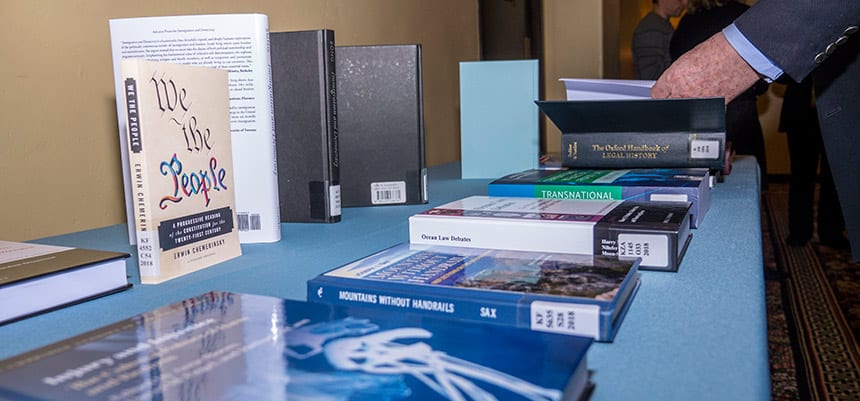
By Andrew Cohen
At its annual celebration of faculty-written books over the past year, Berkeley Law Dean Erwin Chemerinsky marveled at the output of the school’s educators.
“This is a tremendously prolific faculty,” said Chemerinsky, who emceed the event February 26 at the Bancroft Hotel. “It’s wonderful to come together to celebrate these authors. Our colleagues are writing about all the most important social and legal issues, and they contribute to the public discourse in so many ways.”
Chemerinsky noted that the 14 works of legal scholarship comprised just a sampling of the faculty’s collective output, as they did not include casebooks or books outside the realm of law. An online display and brief summary of these and other 2018 books published by Berkeley Law faculty are available here.

This year, a different commentator gave remarks about each book. Confronting a broad range of issues and exhibiting an impressive breadth of expertise, the authors tackled topics from antidiscrimination law and domestic incarceration to immigration and conflict resolution in schools.
Books such as Customary Law Today, written by Professor Laurent Mayali, explored the interplay between different areas of law. His book probes how customary law (where a common practice becomes expected conduct and treated as a legal requirement) affects private, constitutional, business, international, and criminal law. It argues that lawyers should not narrowly focus on statutory law, but also pay heed to the impact of legal practices.
With escalating concerns about climate change, two of the books focused on what covers more than 70 percent of our planet: oceans.
In Stress Testing the Law of the Sea: Dispute Resolution, Disasters, and Emerging Challenges, Co-editor H. Jordan Diamond ’08 and leading practitioners and scholars dissected pivotal developments pressuring the field’s legal framework. Diamond co-directs the school’s Law of the Sea Institute (LOSI) and is executive director of its Center of Law, Energy & the Environment.
“It’s very ambitious in scope, with topics from arbitration resolving maritime disputes, climate change, and how international oceans can facilitate responses to disasters,” Berkeley Law Professor Eric Biber said.
In Ocean Law Debates: The 50-Year Legacy and Emerging Issues for the Years Ahead, Professor and former LOSI Director Harry N. Scheiber co-edited leading scholarship that offers historical insights on key ocean law developments over the past half-century. The book also provides incisive breakdowns of modern-day concerns.
“This book is a great example of the work of [the institute] under Harry’s direction,” said commentator and fellow Berkeley Law Professor Holly Doremus ’91, who co-directs LOSI with Diamond. “It moves seamlessly … and ends with a series of think pieces that sets the stage for future debates about oceans governance.”
The last book mentioned, a re-issue of Mountains Without Handrails by the late Joseph L. Sax, also broached environmental concerns—namely enduring battles over the use of America’s national parks. Known as the pioneer of environmental law, Sax offered a unique approach to their protection and management.
“This is a testament to our faculty’s ability to have influence even in the afterlife,” said Environmental Law Clinic Director Claudia Polsky ’96, who first read Sax’s book as a park ranger specializing in interpretive geology. “It offers a moral argument for our national parks, and urges that we can discover our best selves and forge a national character there. Re-reading the book after three decades, what struck me was the modernity of the book—its staying power.”
Here is a list of the faculty books honored and those who discussed them:
- David A. Carrillo ’95: The Icelandic Federalist Papers (Berkeley Public Policy Press). Commentator: Richard Buxbaum LL.M. ’53
- Erwin Chemerinsky: We the People: A Progressive Reading for the Twenty-First Century (Picador). Commentator: Charles Cannon
- Jordan Diamond ’08 (co-editor with Stephen Minas): Stress Testing the Law of the Sea: Dispute Resolution, Disasters, and Emerging Challenges (Brill Nijoff). Commentator: Eric Biber
- Laurent Mayali (co-editor with Pierre Mousseron): Customary Law Today (Springer). Commentator: Amnon Reichman
- Anne Bloom (co-editor with David M. Engel and Michael W. McCann): Injury and Injustice: The Cultural Politics of Harm and Redress (Cambridge University Press). Commentator: Seth Davis
- Melvin A. Eisenberg: Foundational Principles of Contract Law (Oxford University Press). Commentator: Frank Partnoy
- Calvin Morrill (with Michael C. Musheno): Navigating Conflict: How Youth Handle Conflict in a High-Poverty School (The University of Chicago Press). Commentator: Stephen Sugarman
- David B. Oppenheimer (co-editor with Marie Mercat-Bruns and Cady Sartorius): Comparative Perspectives on the Enforcement and Effectiveness of Antidiscrimination Law (Springer). Commentator: Joy Milligan
- Tony Platt: Beyond These Walls: Rethinking Criminal Punishment in the United States (St. Martin’s Press). Commentator: Jonathan Simon ’87
- Harry N. Scheiber (co-editor with Nilufer Oral and Moon-Sang Kwon): Ocean Law Debates: The 50-Year Legacy and Emerging Issues for the Years Ahead (Brill Nijoff)
- Sarah Song: Immigration and Democracy (Oxford University Press). Commentator: Leti Volpp
- Christopher Tomlins (co-editor with Markus D. Dubber): The Oxford Handbook of Legal History (Oxford University Press). Commentator: Mark Gergen
- Franklin E. Zimring: American Juvenile Justice, 2nd ed. (Oxford University Press). Commentator: Johann Koehler
- Joseph L. Sax: Mountains Without Handrails: Reflections on the National Parks (University of Michigan Press). Commentator: Claudia Polsky ’96